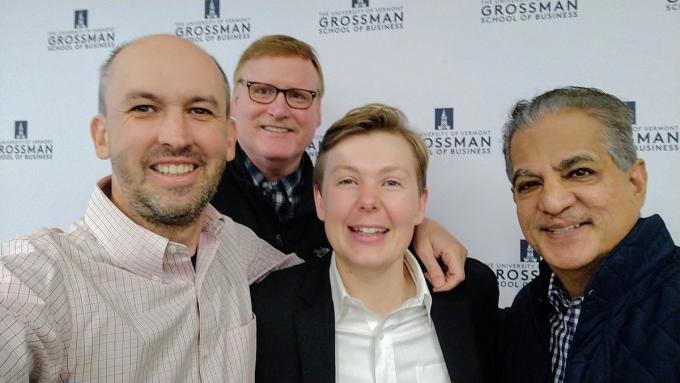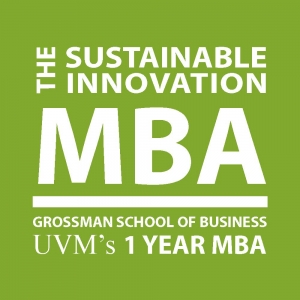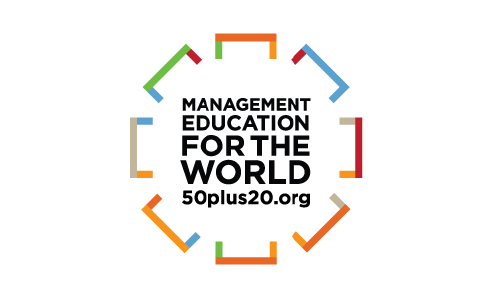By Claire Sommer, Associate Director Communications at GRLI and Stuart Hart, Grossman School of Business, University of Vermont.
In the recent book Questions are the Answer, author Hal Gregersen suggests this very thing. Likewise, this article highlights two ground-breaking initiatives that share this philosophy of asking and holding difficult questions to change the status quo. Our hope is that we will spark questions germane to bridging the talent gap in systemic ways for inclusive business. In our experience, through the two initiatives we will describe, exploring new questions creates space for previously unseen opportunities and possibilities to emerge.
First, we will share the story of the Globally Responsible Leadership Initiative (GRLI), which facilitates the participant-driven Deans & Directors Cohort. The second is the work being pioneered at the Grossman School of Business at the University of Vermont’s one-year Sustainable Innovation MBA (SIMBA) program. The SIMBA leadership team is part of the Cohort.

GRLI’s Inquiry into Global Responsibility
Founded in 2005, the Globally Responsible Leadership Initiative, or GRLI, is the result of the first organised relationship between the United Nations and business schools to address the question of how to develop a generation of globally responsible leaders. The GRLI’s foundation rests on the principles of Whole Person Learning, which sees the human being as existing in a network of relationships, interconnecting arrangements and interdependent systems. The GLRI’s guiding focus is on integrating the “Me, We, and All of Us” into living, learning and leading for Global Responsibility.
The GRLI has catalysed a number of ideas and initiatives including the 50+20 Agenda – Management Education for the World (2012), a blueprint of “what the world would look like if people and planet matters.” The Agenda was launched at the Rio+20 UN Summit on Sustainable Development and continues to influence and resonate today.
Today, the GRLI exists today as a partnering platform that holds a question: "What is Global Responsibility and how might we develop it in leadership and practice?” A few years ago, one of our partners suggested an answer in the form of a new question: “What if we co-created a safe space for business school deans who want to act as catalysts of change for their own institutions and across the higher-education landscape?” From there, the GRLI Deans & Directors Cohort was born.
Now in its third year, the Cohort operates like a participant-driven collaboratory (another GRLI-facilitated concept) and includes leaders from business schools in 14 countries. The team has already bridged institutional and disciplinary boundaries, opened new research avenues, started work on new centres and programmes, and developed several collective impact initiatives aimed at transforming management education. For more, see the February 2019 EFMD Global Focus article titled Results Oriented.
A Boundary-Breaking MBA

Which brings us to our next example—the one-year Sustainable Innovation MBA (SIMBA) program at the University of Vermont’s Grossman School of Business, ranked as the #1 Best Green MBA in 2019 by the Princeton Review.
As Stu explains, there certainly has been attention on innovation in the past 20-30 years in management education. But largely lacking are efforts to address underlying issues by asking “What could be, and what’s next?” It’s only very recently that there is traction around wholly transforming business education to address existential issues of climate change, poverty, and inequality.
The challenges we face cannot be addressed by adding a course here and a course there.
Instead, the SIMBA programme was built to fundamentally reinvent business education and the MBA degree from the foundation up. By “changing the horse instead of the saddlebags,” SIMBA seeks to prepare students to solve systemic, global challenges through the lens of enterprise and entrepreneurship.
It was Grossman School of Business Dean Sanjay Sharma who was instrumental in pulling together people to work on a new vision of management education that grew into the 50+20 mission and agenda back in 2012. And indeed, it has been Dean Sharma’s courageous leadership that has ushered in the birth of an entirely new kind of business programme at the University of Vermont.

Sometimes, it can take a while for visionary ideas to find the right people, place, and time to take hold—as the SIMBA team knows full well. Deans who want to do something different have to take fire. Transformational change isn’t ever easy and requires bold—and then consistent—action. That’s what Sanjay did, and even with favourable conditions he still took a lot of heat. It took guts to enable an experiment to get off the ground and steadfast commitment to ensure it survived long enough to succeed.
As GRLI Executive Director John North explains, “We’re not going to think our way into new ways of acting. We need to act our way into new ways of thinking.”
Sanjay and our team had a vision and way of thinking that has been allowed to evolve and develop by acting and iterating. Piloting allows you to make changes you can only imagine once you've taken the first step. It’s the same in business—CEOs need this kind of backbone to stand up to create the protective space that allows innovation to grow.
We hope you’ve been inspired by learning more about the GRLI and the SIMBA programme. Both are breaking free of traditional institutional bounds to explore entirely new ideas of how we can live, learn, and lead together—fuelled by the practice of inquiry and the courage to explore. Indeed, the next generation of talent will need these traits to tackle the greatest challenges of our time.
Additional Resources:
About the Sustainable Innovation MBA:
